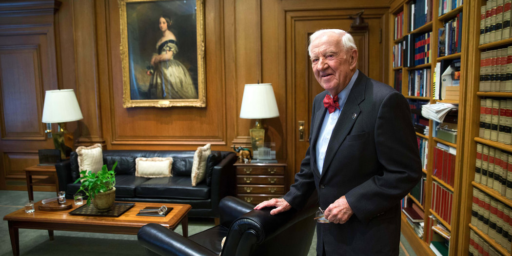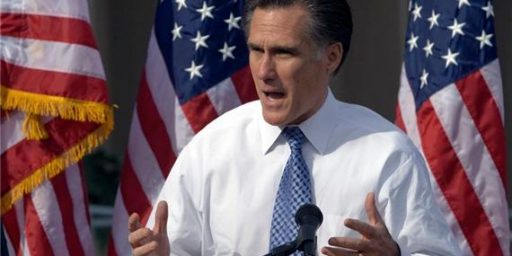Millionaire Penalty Struck Down by Supreme Court
McCain-Feingold, the signature legislation of the presumptive Republican nominee for president, took another blow yesterday as the Supreme Court struck down the so-called “Millionaire’s Amendment” in yet another 5-4 decision.
“Supporters of reasonable campaign finance regulation are now zero for three in the Roberts court,” said Richard L. Hasen, a professor at Loyola Law School in Los Angeles. “This is a signal of what is to come. What could easily fall following this case are the longstanding limits on corporate and union spending in federal elections.”
The law at issue in Thursday’s decision imposed special rules in races with candidates who finance their own campaigns. Those candidates are required to disclose more information, and their opponents are allowed to raise more money. The Supreme Court has upheld campaign finance laws meant to drive the potentially corrupting influence of large contributions out of politics. But the millionaire’s amendment, part of the 2002 McCain-Feingold campaign finance law, is based on a different rationale: that of compensating for the additional financial resources available to candidates willing to spend their own money.
[…]
Justice Samuel A. Alito Jr., writing for the majority, said the asymmetry imposed by the law was unacceptable. “We have never upheld the constitutionality of a law that imposes different contribution limits for candidates who are competing against each other,” Justice Alito wrote.
The law allows opponents of candidates for the House who spend more than $350,000 of their own money to receive triple the usual amounts — $6,900 rather than $2,300 — from individual contributors when a complex statutory formula is met. The law also waives limits on expenditures from political parties. The law was a response to Supreme Court rulings that forbid limits on the amount that candidates can spend on their own behalf. But Justice Alito wrote that the legislative response was unconstitutional because it “imposes an unprecedented penalty on any candidate who robustly exercises” free speech rights guaranteed by the First Amendment. Rich candidates, Justice Alito said, must “choose between the First Amendment right to engage in unfettered political speech and subjection to discriminatory fund-raising limitations.”
[…]
“Different candidates have different strengths,” Justice Alito wrote. “Some are wealthy; others have wealthy supporters who are willing to make large contributions. Some are celebrities; others have the benefit of a well-known family name.” “Leveling electoral opportunities means making and implementing judgments about which strengths should be permitted to contribute to the outcome of an election,” Justice Alito continued. “The Constitution confers upon voters, not Congress, the power to choose the members of the House of Representatives.”
[…]
Justice John Paul Stevens, joined by Justices Stephen G. Breyer, Ruth Bader Ginsburg and David H. Souter, dissented, saying that both “reducing the importance of wealth as a criterion for public office and countering the perception that seats in the United States Congress are available for purchase by the wealthiest bidder” offered valid justifications for the amendment. “The millionaire’s amendment quiets no speech at all,” Justice Stevens wrote. “On the contrary, it does no more than assist the opponent of a self-funding candidate in his attempts to make his voice heard; this amplification in no way mutes the voice of the millionaire, who remains able to speak as loud and as long as he likes in support of his campaign.”
While I firmly agree with the outcome and the reasoning of the majority, Stevens actually has the better public policy argument.
The Court here continues a long line of opinions which proclaim that, in political campaigns, the ability to spend money to buy television advertising is tantamount to speech. Yet, it also lets stand than aberrant ruling which says that the desire to protect against the theoretical corrupting influence of outside money is a sufficiently compelling public purpose for restricting said speech. Under that premise, then, it’s hard to argue that preventing rich people from outspending a candidate hamstrung by the law isn’t equally compelling. If a candidate is going to be corrupted by having a corporation or interest group donating $100,000 why isn’t it corrupt for, say, the CEO of said corporation or head of said interest group to spend $3 million getting himself elected?
For his part, John McCain is not concerned by the ruling. He notes that this provision was, as the name implies, an amendment “added on the floor during debate.” (Contra Ann Althouse, a floor amendment has little in common with a Constitutional Amendment. The former is often necessary compromise to get a larger bill passed; the latter is an independent action requiring supermajority passage.) The takeaway is that “Today’s Supreme Court decision in Davis v. FEC does not affect the Court’s landmark ruling in McConnell v. Federal Election Commission upholding the constitutionality of the soft money ban contained in BCRA. That ban is at the core of the reforms I worked for in the long bipartisan fight to pass campaign finance reform.”
He’s right. Yesterday’s Court decision protects the interests of a relative handful of millionaire candidates for office. But it does not restore the rights of tens millions of Americans who have organized themselves politically to spend their money — which the Court acknowledges is speech — as they see fit in trying to defeat said millionaires. It’s a very strange paradox.






Jack Davis tried to buy himself an audience. McCain-Finegold (it’s philosophy…and this particular extension of that mess) prevented him from doing that, again on the idea of ‘fairness’.
What this boils down to is that while the first amendment does uphold the right of free speech, it does not gurantee an an audience.
which is complete and utter nonsense. Money does not purchase speech, money buys an audience. The constitution protects speech content, it does not guarantee an audience. What the money = speech doctrine does is create, out of whole cloth, the right to an audience for your speech. If the supreme court is saying that they have excavated a new right under the 9th they should say so.
The assumption here is that the more a candidate appears on TV, radio and billboards, the more ‘voice’ they have, and the more they are exercising free speech. Although McCain-Feingold looks to use money to level the playing field, in reality I’m not sure upping the personal donation allowances that can be made to candidates up against a millionaire tycoon really makes that much difference to the candidates, or to how much their ‘voices’ are heard by voters.
If McCain-Feingold (and, for different reasons, SCOTUS) are going to equate amount of time spent present in the media with amount of free speech exercised, maybe having TV stations set an advertising quota for each candidate or something something similar would make more sense than complex campaign finance regulation re-jigging. Also, guaranteeing non-self financed candidates a certain amount of media space may to some extent dull the need to seek funding from lobbies or corporations.
God,I’m agreeing with Bithead …check the temp in hell 🙂
Well, Rick, I have to say that I wonder if the added money would have made much difference in Davis’ attempts. I live right smack in the middle of that one. consider the weight of those votes.. someone who comes off as being far to liberal for residents of NY state.
Be that as it may, I’m going to keep this one in my permalink list for when arguments about the ‘fairness doctrine’ come up, as I suspect they will. Seems to me the point surrounding the lack of a guranteed audience in the first amendment will play heavily there.
Well…no. That’s like saying you’ve got a right to voice your opinions about government if you do it inside your house but that you don’t have any right to do so in the public square. Clearly, that’s not the case, even though time, place, and manner restrictions can apply.
If you can’t spend money to air commercials, you are effectively silenced in terms of national discourse. Otherwise, you’re relying on the mercies of the broadcasters for free time.
Effectively, by the way, that’s a recipe for ensuring that incumbents and others with powerful name recognition (celebrities, mostly) win without a fight.
The McConnell decision rejected a facial challenge to McCain Feingold, it left the door open for piecemeal challenges to the law as it is applied. And particularly with Alito replacing O’Connor, I think the pieces are getting chipped away.
If McCain gets to appoint a Justice, the future of McCain Feingold may be grim.
As it should be.
Can we point to situations where incumbants have been tossed out without such ‘equality’? I daresay the 94 mid-terms answer that one. That being the case, perhaps you mis-identify the issue.
Can we point to situations where incumbants have been tossed out without such ‘equality’? I daresay the 94 mid-terms answer that one. That being the case, perhaps you mis-identify the issue.
Posted by Bithead | June 27, 2008 | 11:16 am | Permalink
In ’94 (and ’76) incumbents will have lost en masse to opponents because of the nationally publicised woes of their parties, not because the opponents of incumbents locally were particulary adept at campaigning on a shoe-string. In these election years local campaigning was irrelevant. In ordinary circumstances things are still much, much easier for the well-funded, incumbents or recognisable names.
and the more recent Democrat takeover was all on issues? Comon’…
Ok, but isn’t public policy more properly under the purview of the legislative and executive branches?
Indeed. Then again, if money equals political speech in this process, I’d argue that most of McCain-Feingold, not just a handful of peripheral provisions, are plainly unconstitutional. That, post-1803, is the Court’s purview.
In 2006, like 1994 and like 1976, the incumbent party was politically unpopular for reasons more national than local, and the fact that less-well funded or less-well known local Democratic candidates beat incumbent Republicans didn’t prove that incumbency and money aren’t ordinarily advantageous, just that in *some* years the wind is behind a particular party and the local candidate can get away with having less money and less campaigning on the ground, or with running less commercials – but this is the exception rather than the rule.
A bit of a stretch.